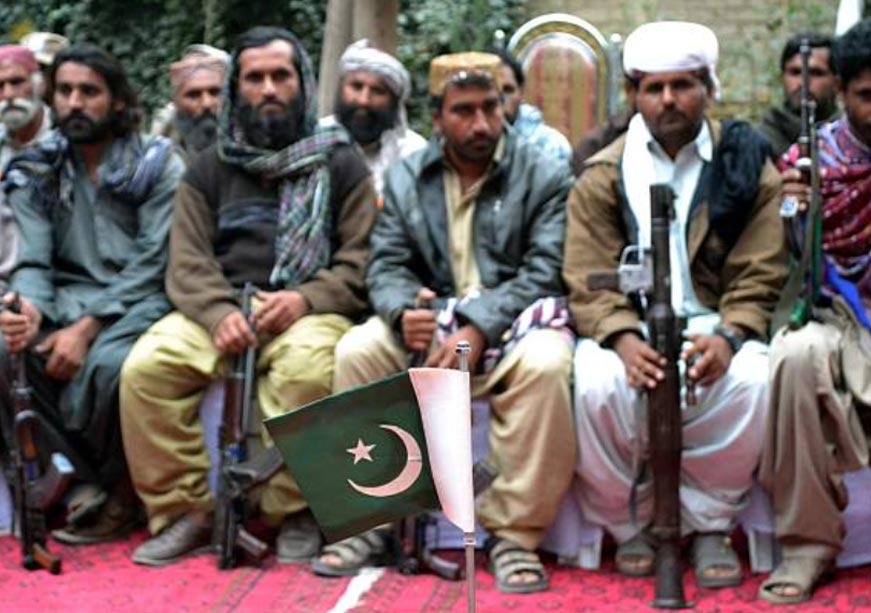-
CENTRES
Progammes & Centres
Location
ISKP finds refuge in Balochistan as Pakistan’s ambiguous strategy stokes regional conflict and global terror risks.

Image Source: Getty Images
In the volatile landscape of Central Asia and South Asia, a disturbing strategic realignment is unfolding, with Pakistan at its epicentre. The region, already scarred by decades of conflict, now faces a new threat as the Islamic State Khorasan Province (ISKP) has shifted its operational base from Afghanistan to Pakistan’s Balochistan province. This relocation, far from being a mere consequence of regional turmoil, appears to be a calculated move facilitated by Pakistan’s ambiguous policies. The Taliban’s consolidation of power in Afghanistan after the 2021 United States (US) withdrawal, along with Pakistan’s alleged use of ISKP against both the Taliban and Baloch separatists, underscores a precarious strategy that heightens risks in an already unstable region.
The advent of ISKP in 2015 signified a stark transformation within the transnational jihadist landscape of the Afghanistan-Pakistan border regions. In contrast to the Afghan Taliban, the ideology of ISKP is characterised by a lethal Salafist framework that possesses a global ambition, seeking to establish a transnational caliphate (calling for a worldwide (Caliphate) Ummah) through extreme sectarian violence. After the Taliban’s return to power, their effective counter-insurgency campaign forced ISKP out of Afghanistan, leading to a strategic retreat across the porous Durand Line into Balochistan in Pakistan. This province, with its vast ungoverned spaces and ongoing insurgency, provided an ideal sanctuary to ISKP. Islamabad initially dismissed reports of ISKP’s presence as propaganda. However, the reality became undeniable with attacks such as the 2024 Kerman bombings in Iran and the Moscow concert hall massacre, both of which can be traced back to Balochistan.
The entry of ISKP into Balochistan has triggered a violent confrontation with Baloch ethno-nationalist groups.
The entry of ISKP into Balochistan has triggered a violent confrontation with Baloch ethno-nationalist groups such as the Baloch Liberation Army (BLA) and the Balochistan Liberation Front (BLF), both of which seek independence from Pakistan. Their nationalist aspirations are in sharp contrast to the ISKP’s theocratic agenda. In March 2025, BLA staged a pre-emptive raid on ISKP camps near Mastung, killing 30 terrorists. ISKP responded with a public declaration of war in a 36-minute-long video published by the group’s media arm Al Azaim on 25 May 2025, possibly indicating the collapse of an earlier, informal non-aggression understanding. In the video, ISKP portrayed Baloch separatists as “secular, nationalists and pro-democracy—traits the terror group sees as ‘un-Islamic’.” This battle adds a combustible element to Balochistan’s security matrix, pitting global jihadism against ethno- nationalism, with the Taliban likely intervening secretly to further damage the ISKP.
At the heart of this crisis lies Pakistan’s policies in the region that have been implicated in enabling certain militant groups, raising concerns about state oversight and counterterrorism effectiveness. Evidence suggests not mere negligence but complex strategic considerations by the state and its intelligence apparatus. Experts note that it is implausible that Pakistan was unaware of ISKP’s significant presence in Balochistan. Instead, tolerating their presence seems to be a deliberate tactic to gain leverage over Afghanistan. By allowing ISKP to operate, Pakistan can indirectly pressure the Taliban government in Kabul, which is often blamed for ISKP’s actions, while addressing its grievances over Tehrik-e-Taliban Pakistan (TTP) sanctuaries in Afghanistan. This proxy strategy is a well-documented facet of Pakistan’s security doctrine, but it comes with grave risks.
At the heart of this crisis lies Pakistan’s policies in the region that have been implicated in enabling certain militant groups, raising concerns about state oversight and counterterrorism effectiveness.
Furthermore, Pakistan seems to employ ISKP as a weapon against Baloch separatists. As mentioned previously, ISKP, rooted in Salafi-jihadist ideology, deems ethnic-nationalist groups as heretical due to their secular, ethnocentric worldview. For Islamabad, this enmity presents an opportunity: by tacitly allowing ISKP to operate in parts of Balochistan—without direct funding or overt coordination, it can harness the group’s violence against separatists while maintaining plausible deniability.
This convergence serves a dual purpose. First, it shifts the burden of counterinsurgency away from state forces, whose past operations have often attracted domestic and international criticism. Second, it exploits ISKP’s own agenda to eliminate ideological rivals, thereby indirectly weakening separatist capacity through sustained attrition. While risky—given ISKP’s broader anti-state ambitions, this strategy reflects Islamabad’s willingness to tolerate short-term volatility in exchange for the longer-term goal of subduing Baloch dissent without bearing the full cost of direct repression.
These approaches exemplify Pakistan’s enduring strategy of utilising terrorist proxies to further its strategic objectives. Components of the security apparatus, particularly the intelligence agency of Pakistan, Inter-Service Intelligence (ISI), have sustained clandestine links with homegrown local Salafi and Deobandi jihadist organisations such as Lashkar-e-Taiba (LeT), Jaish-e-Mohammed (JeM), Lashkar-e-Jhangvi (LJ), and Harkat-ul-Jihad al-Islami (HuJI), as well as the lethal transnational Salafi group Al Qaeda (AQ). It is crucial to highlight that these Pakistan-bred terror outfits share close affiliations with Al Qaeda within Pakistan through Brigade 313.[i] Militant organisations such as the Haqqani network, while not officially affiliated with the state, have frequently functioned with implicit backing from entities connected to Pakistan. According to Vanda Felbab-Brown of Brookings, Pakistan had augmented “Afghanistan’s instability by providing intelligence, weapons, and protection to the[…]Haqqani network”.
These approaches exemplify Pakistan’s enduring strategy of utilising terrorist proxies to further its strategic objectives.
Recently, in May 2025, the Pakistani Defence Minister, Khawaja Asif, admitted that Pakistan had supported such groups for over three decades, and the Vice President of the Pakistan People’s Party (PPP), Sherry Rehman, also acknowledged that Islamabad’s past is linked to terrorism. These rare acknowledgements strengthen the argument that Islamabad’s current permissiveness toward ISKP in Balochistan may reflect a broader strategy of proxy warfare to manage internal dissent and regional threats.
Following international outrage over the Kerman and Moscow attacks, Pakistan arrested and extradited the alleged co-conspirator in the 2021 Kabul airport attack, ISKP commander Mohammad Sharifullah—to the US in March 2025, accompanied by a media campaign portraying Islamabad as a committed and cooperative counterterrorism partner. The arrest appears to be more indicative of strategic bargains than genuine endeavours to dismantle ISKP networks. Despite the sacrifice of a prominent operative, hundreds of others continue to operate from Balochistan, largely unaffected, as Pakistan’s military concentrates its aggression on Baloch separatists.
This selective action mirrors a recurring tactic: whenever Financial Action Task Force (FATF) scrutiny looms, Pakistan showcases arrests such as that of Hafiz Saeed to signal a façade of robust counterterrorism efforts. These moves often prioritise diplomatic and financial leverage over meaningful disruption of militant networks, allowing extremist groups to persist and undermining regional stability. Such calculated gestures reveal a pattern of short-term posturing rather than a sustained fight against terrorism.
Pakistan’s duplicitous policy of selectively targeting terrorists while tolerating ISKP’s presence in Balochistan is a perilous gamble.
Pakistan’s duplicitous policy of selectively targeting terrorists while tolerating ISKP’s presence in Balochistan is a perilous gamble. This precarious balancing act with various terrorist groups is inherently unstable, risking a collapse of the fragile truce with ISKP that could trigger catastrophic consequences within Pakistan and beyond. The international community must look past Islamabad’s carefully curated narrative of high-profile arrests and recognise the proxy conflicts at play. By instrumentalising ISKP to suppress Baloch nationalists, Pakistan fuels domestic unrest and strengthens a potent global terrorist threat, as evidenced by recent attacks in Kerman and Moscow. This policy destabilises the region by enabling cross-border militancy, undermining neighbouring countries’ security, and weakening counterterrorism efforts. Globally, it allows ISKP to exploit safe havens, plan sophisticated attacks, and inspire lone-wolf actors, threatening international stability. The façade of counterterrorism cannot mask the reality of breeding and state-sponsored sanctuaries. Pakistan’s complicity, whether by design or negligence, risks escalating conflicts, emboldening extremist networks, and inviting further attacks. The international community must hold Pakistan accountable, demanding transparent action to dismantle ISKP’s infrastructure. Failure to address these dubious orchestrations could lead to spiralling chaos, with devastating consequences for regional and global security.
Priyadarshini Baruah is a Research Associate at the Centre for Aerospace Power and Strategic Studies (CAPSS), New Delhi.
[i] Nothing exemplifies Pakistan’s deep entanglement with jihadist militancy more than Brigade 313 and its leader, Ilyas Kashmiri—a former Pakistan Army-trained commando who rose to become one of Al Qaeda’s most dangerous operatives. Before being killed in a 2011 U.S. drone strike, Kashmiri headed Brigade 313, widely regarded by intelligence experts as Al Qaeda’s most lethal operational arm in the region. The group operated primarily along the Afghanistan-Pakistan and India-Pakistan borders, often blurring the line between state-supported militancy and transnational jihad.
The views expressed above belong to the author(s). ORF research and analyses now available on Telegram! Click here to access our curated content — blogs, longforms and interviews.

Priyadarshini Baruah is a Research Associate at the Centre for Aerospace Power and Strategic Studies (CAPSS), New Delhi. At CAPSS, she is working on a ...
Read More +